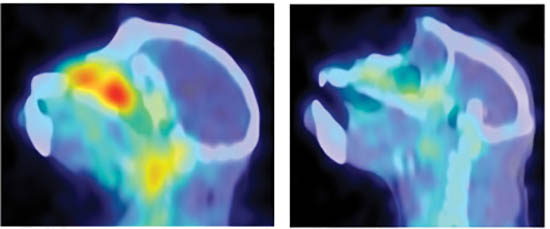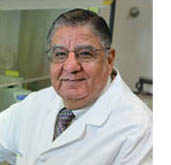Antibody Treatment Controls HIV-like Infection in Monkeys

In a study that is being called a game-changer by the HIV research community, scientists from Emory and the National Institute of Allergy and Infectious Diseases (NIAID) have achieved sustained control of SIV (the simian version of HIV) in infected monkeys given an antibody on top of standard antiviral drugs.
The antibody, currently used to treat inflammatory bowel disease, was designed to stop susceptible immune cells from entering intestinal tissues—a hot spot of damage during acute HIV and SIV infection. It was used along with antiretroviral drugs during and after drug treatment.
When the antiretroviral drugs were stopped, SIV did not re-emerge in monkeys that had been given the antibody. If it works on humans with HIV in the same way, this could be a step toward a "functional cure," which would allow patients to stop taking their antiretroviral drugs without the virus rebounding.
The paper, published October 13 in Science, received reactions of "fascinating," "a complete first," "striking," and "too amazing to be real" by other researchers in the field.
|
Pathologist Aftab Ansari |
A team led by immunologist Aftab Ansari and colleagues at Yerkes National Primate Research Center infected eight rhesus macaques with SIV, treated them with antiretroviral drugs, and then infused them with an antibody similar to an FDA-approved drug for Crohn’s disease and ulcerative colitis, vedolizumab, that targets a receptor on immune cell surfaces. More than nine months after the antiretroviral drugs and antibody treatments were stopped, all eight animals had low or undetectable levels of SIV in their blood. In seven SIV-infected control animals that received a placebo, the virus rebounded to high levels within two weeks of stopping antiretrovirals.
"This comes from an idea I had many years ago: stopping CD4+ T cells from circulating into the gut may offer protection during acute infection," says Ansari, a professor of pathology and laboratory medicine. "But precisely how it works in regulating viral replication is still far from clear. The antibody therapy appears to have helped reconstitute the entire immune system."
This was the first consistent demonstration of post-treatment immune control in monkeys infected with SIV, without previous vaccination.
"The results knocked us out, they were so stunning," says co-author Anthony Fauci, an immunologist who heads the National Institute of Allergy and Infectious Diseases (NIAID).
More than a million people in the U.S. and about 35 million worldwide are living with HIV. Long-term post-treatment control of HIV has been reported in only a handful of people treated soon after infection.
A pilot clinical trial testing the safety of vedolizumab and its effect on people with HIV has begun at NIAID. The trial, which hopes to enroll 20 people, is mainly a safety assessment, but participants will go off antiretrovirals, and then the researchers will closely monitor them to see whether their HIV levels rise or remain suppressed.
"This finding could become a blueprint for an alternative therapy for HIV, so someone would not need to continuously take antiretroviral drugs," Ansari says.






